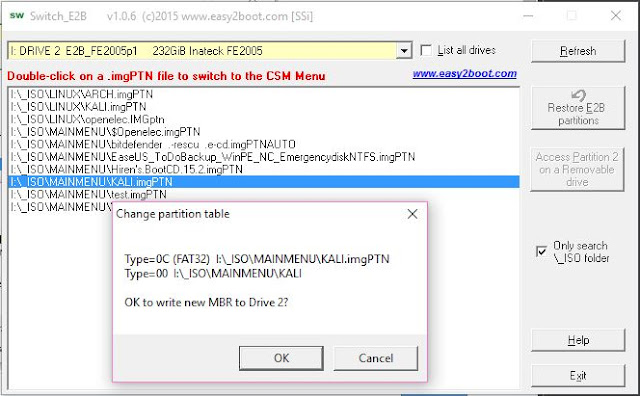It was reported to me that SWITCH_E2B did not work on E2B USB flash drives that had been formatted using
FlashBoot, so I have now made version 1.0.3 available for those of you that use FlashBoot with E2B. If you use FlashBoot, you can update your E2B drives and your MPI installation ( the MPI .\csm\e2b folder) with the new version of SWITCH_E2B.exe.
Update: v1.0.3 only worked if the volume name was kept as 'FLASBOOT'.
v1.0.4 should now work with any volume name.
If you often find yourself needing to USB boot from older systems a lot (e.g. repair shop), you should check out FlashBoot!
E2B drives prepared using FlashBoot should boot on a wider variety of systems, especially older systems with early (buggy) USB BIOSes that try to boot USB drives as a floppy disk or USB ZIP drive instead of as a hard disk.
If a BIOS boots from a USB Flash drive as a floppy/ZIP drive instead of a hard disk, this causes grub4dos to fail to boot. If you use RMPrepUSB\RMPartUSB to format the USB drive, it adds a second small hidden partition and this often helps to avoid the 'boot as floppy' problem - but not always!
If you prepare your USB Flash drive with
FlashBoot, you may find that it will boot on some of these older systems that would not boot from a 'normal' E2B drive.
However, there are some drawbacks to using a drive that has been formatted with FlashBoot:
- You have to format the USB drive as FAT32 with FlashBoot (NTFS is not supported). So this limits your maximum file size to 4GB. FlashBoot is not limited to creating 32GB partitions however and will work with both large USB hard disks and removable flash drives.
- You cannot reboot to the CSM Menu once you switch into any .imgPTN partition image. You can boot to the E2B menu, switch to a .imgPTN menu and then run the CSM Menu, however you cannot reboot to the CSM menu (a fresh boot) because the code in the MBR is specific to FlashBoot and it expects a partition to be present which contains FlashBoot boot code and not the 'normal' .imgPTN image partition that has been switched in.
FlashBoot is a commercial product (25 Euros), but you can try it for free for a limited period and see if it works on your 'difficult' old systems before you buy the full version.
P.S. You can also try out the Emergency Boot CD (EBCD) .ISO download too!
